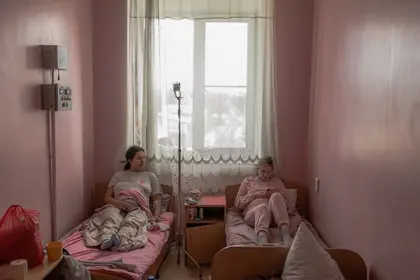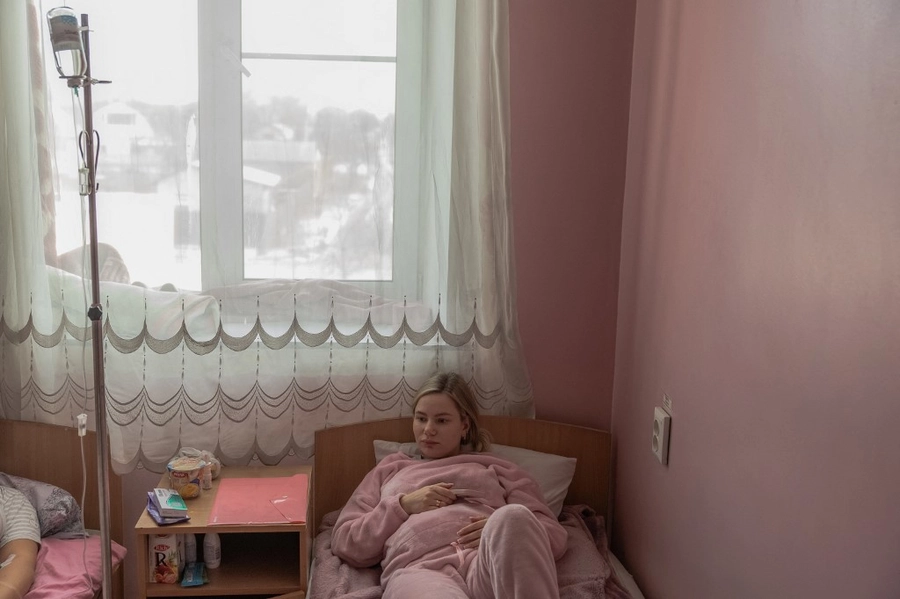With a pink jumper covering her round belly, Yana Lyakh was all smiles at a Ukraine hospital even as she recounted what for most women would be a nightmare situation.
The 26-year-old is eight months pregnant, her husband is away fighting on the front line and her home town is being relentlessly bombed and shelled by Russian forces.
JOIN US ON TELEGRAM
Follow our coverage of the war on the @Kyivpost_official.
In search of a safe place, she moved into a maternity ward weeks ahead of her due date in the town of Pokrovsk, in Ukraine's eastern Donetsk region.
"I'm here because of the stress," she told AFP from her bed in a hospital room she shares with another expectant mother.
This maternity hospital is the only one in the entire Donbas region with a neonatal unit and incubators for babies born prematurely.
Despite air raid alerts and shelling, it has worked constantly since Russia invaded almost two years ago.
Lyakh used to live in Myrnograd, a town a few kilometres to the east and closer to the front line.
Russia started shelling both towns on January 6 when it killed 11 people, including five children, she said.
Spooked by air raid warnings and the risk of bombs falling on her apartment block, heavily pregnant Lyakh "used to run from the fifth floor down to the first", she said.
"That's why I came here. There was a threat" of giving birth prematurely, she said.
In another bed in the ward, 20-year-old Katya Brendyuchkova -- also eight months pregnant -- was hooked up to a drip.

Zelensky Meets CIA Director William Burns in Ukraine
"I'm having difficulties now. There is a possibility of premature delivery," she said.
Her husband is not a soldier, but works in a coal mine in Pokrovsk.
- 20 percent premature -
Pokrovsk is around 30 kilometres (18 miles) from one of the hottest spots on the sprawling front line: the raging battle for Avdiivka, a strategic town that Russian forces have been trying to seize for months.
In the two-storey maternity hospital, some windows were protected by sandbags.
Part of the basement has been converted into a bomb shelter and generators provide power when the electricity cuts out.
Yana Lyakh, 26, who is eight months pregnant, lays on a bed in a maternity hospital in Pokrovsk, Donetsk region, on January 24, 2024, amid the Russian invasion of Ukraine. Roman PILIPEY / AFP
Gynaecologists and nurses have left and patient numbers are also down after most residents fled eastern Ukraine at the start of the invasion.
Lyubov Datsyk, head of the obstetrics department, said births had halved from around 1,000 a year before the war to 500 in 2022 and 622 last year.
Around 20 percent of the babies delivered in 2023 were premature, up from 10 percent before the war.
Doctors are in no doubt the Russian invasion is to blame.
"Premature birth is caused by stress, chronic stress. Given that our patients are in a sort of grey zone and the whole of the Donetsk region is a war zone, the number of premature births has increased," said Ivan Tsyganok, head of the maternity unit.
That stress is aggravated by the fact that half of the women have husbands at the front.
"The women are worried about both their husbands and their children," Datsyk said.
- Pregnant widows -
There have been cases of fathers being killed while their wives were in hospital, staff said.
Sometimes they decide not to tell the mother until after the birth, Datsyk said.
Otherwise, the expectant mother "knows she is a widow", she said.
The Russian invasion hangs over the children even before they are born.
"When we have our children, we want them to have a bright future. But today, they are born and it's war. They are children of war," Tsyganok told AFP.
Lyakh is planning to travel to give birth in Dnipro, a large city 150 kilometres to the west.
After that, she and her daughter, whom she plans to name Sofia, will move to the capital Kyiv.
Her husband is a 23-year-old lieutenant fighting in Avdiivka to hold off Russian forces.
He visits her once a week in hospital.
"He should get transferred (close to Kyiv), so we'll be spending more time together. We're looking forward to it," Lyakh said.
Brendyuchkova, who already has a three-year-old girl, said she was scared by the constant bombing and would like to leave.
"I want to go somewhere else," she said. "But so far, there's no chance. And as long as my husband has a stable job, we'll stay here for the time being."
You can also highlight the text and press Ctrl + Enter







